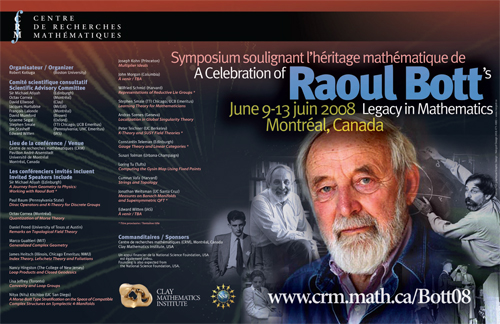in Mathematics


Raoul Bott was a “citizen of the world” in that he was born in Budapest Hungary in 1923, moved to Slovakia soon after, and when he was 16, spent a year in being schooled in England. He then lived in Canada for six years where he obtained two degrees in Electrical Engineering from McGill University, during which time he resolved to become a mathematician. Bott finished a ScD in applied mathematics under Richard Duffin at CMU (which at that time was Carnegie-Tech)[1], with a thesis that solved the most challenging synthesis problems in electrical network theory at that time. A humbling encounter with Herman Weyl landed him an invitation to the IAS at Princeton where, after a few relatively intense transitional years, the application of Morse theory to the problem of computing geodesics on Lie Groups, and the Bott periodicity theorem for the stable homotopy groups of the classical Lie groups, helped metamorphose him into one of the most influential topologists of the 20th century. Starting with an appointment at the University of Michigan, it took about 10 years to be tenured at Harvard and graduate two students (Daniel Quillen and Stephen Smale) who would eventually be awarded Fields medals for their work in topology. Raoul Bott’s collected papers[2] testify to his contributions to mathematics[3], and we will not try to summarize them here. The present conference strives to be forward looking and will feature prominent researchers who see further by standing on Bott’s shoulders.
Although Bott’s deepest results are clearly in mathematics, those of us who knew him recall his wide-ranging interests in mathematics, physics and engineering. The Clay Mathematics Institute, cosponsoring the event, and an expectation of Funding from NSF, the conference is proving to be an opportunity to bring together influential mathematicians with unique perspectives on the mathematical legacy of Raoul Bott.
Looking forward, the conference is not a systematic attempt to summarize the mathematics found in the four volumes of his collected works, published over a decade ago. Rather, we plan to have a view of how the mathematics Bott mastered is manifested in current mathematical research and emerging applications.
Sir Michael Atiyah (Edinburgh)
Octavian Cornea (Montréal, Dir. ISM)
David Ellwood
(Clay)
Jacques Hurtubise (McGill)
Francois Lalonde (Montréal, Dir. CRM)
David Mumford
(Brown)
Graeme Segal
(Maths, Oxford)
Stephen Smale
(TTI Chicago, UCB Emeritus)
Jim Stasheff (Pennsylvania, UNC Emeritus)
Edward Witten
(IAS, Princeton)
The Life and Works of Raoul Bott
Raoul Bott: The New York Times

Download poster